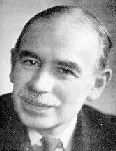 Keynes,
John Maynard
(1883-1946)
Keynes,
John Maynard
(1883-1946)

 Keynes,
John Maynard
(1883-1946)
Keynes,
John Maynard
(1883-1946)
His trenchant criticism of the peace treaty of Versailles (1919) with Germany in The Economic Consequences of the Peace (1919) made him famous overnight and effectively undermined public support for the treaty. His early economic work, as exemplified in Indian Currency and Finance (1913) and A Tract on Monetary Reform (1923), was in the Marshallian tradition, but during the crises of the 1920s he came increasingly to identify conservative economic policies as the cause of Britain's economic problems. From this beginning, he developed a new theory of income determination, grounded in the concept of the 'consumption function', the 'liquidity preference theory of interest', and the inflexibility of money wages. The consumption function referred to a relationship between total consumer spending and national income, such that consumer spending always rises less than proportionately with income, leaving a savings gap that only private or public investment can fill. The liquidity preference theory of interest emphasised the role of the interest rate as the reward for doing without the advantages of money as the only perfectly liquid asset. The inflexibility of money wages, themost controversial of Keynes' leading principles, was grounded on a realistic appreciation of labour markets in a modern industrial economy. Full employment, Keynes concluded, could be maintained in a capitalist economy but only if the government were willing to incur counter-cyclical budgetary deficits to offset the inbuilt tendency towards private over-saving.